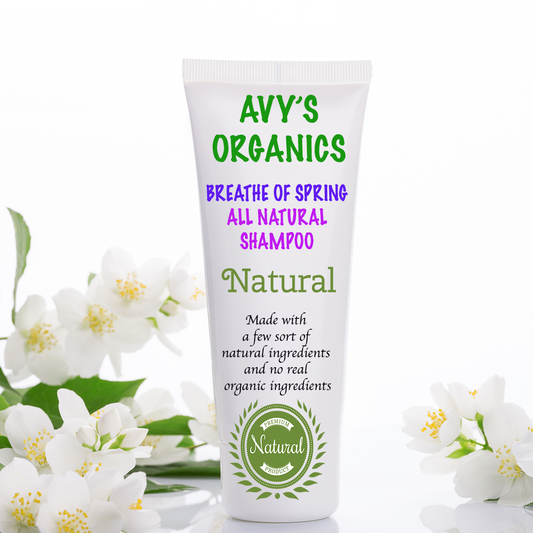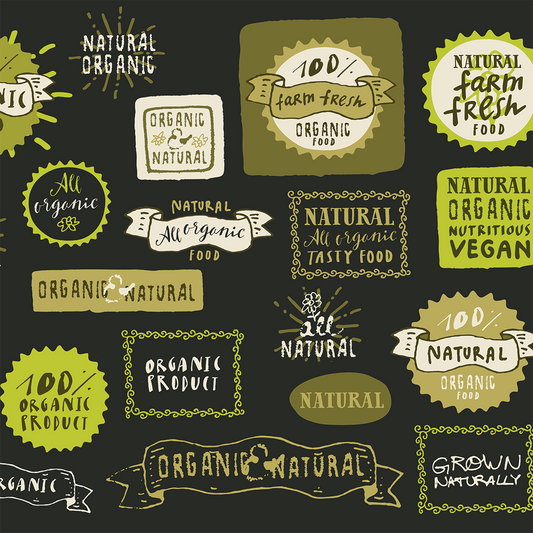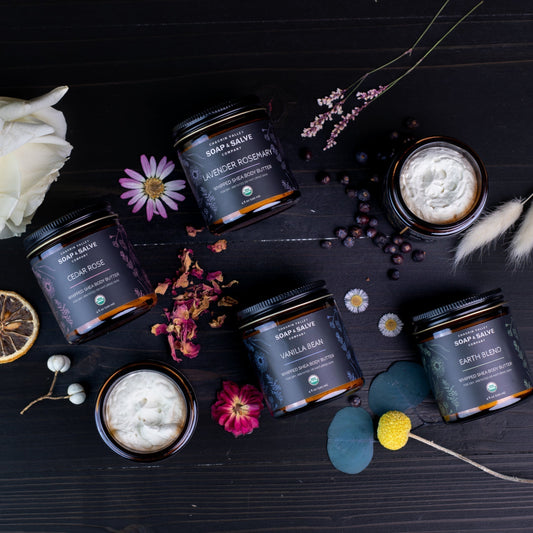What Do Organic Labels Mean?
 We receive so many questions about Organic Labeling and Organic Logos. The whole process of labeling organic products can be very confusing. I hope the long (sorry) explanation below helps answer some of your questions!
We receive so many questions about Organic Labeling and Organic Logos. The whole process of labeling organic products can be very confusing. I hope the long (sorry) explanation below helps answer some of your questions!
When it comes to organic there are a lot of questions to ask.
What is the definition of organic? What does it mean for a product to be organic? How do the organic standards apply to soap and skincare products? What do the different organic symbols mean? How do consumers distinguish true organic from organic claims?
The Meaning Of "Organic" As Defined By The USDA!
The organic food industry is regulated by the United States Department of Agriculture (USDA).
At this time there are no standards created specifically for the personal care product industry. Organic certification of personal care products is based on organic food standards (NOP) set by the National Organic Program of the USDA.
According to the USDA Deputy Secretary Kathleen Merrigan,
"The USDA regulates organic personal care products only if they are made up of agricultural ingredients. We have no standards for personal care products and have no plans to develop standards at this time."
The National Organic Program (NOP) was created in 1990 after Congress passed the Organic Foods Production Act (OFPA) to ensure that agricultural products marketed as "Organic" would meet consistent and uniform standards.
The term "organic" refers to the way agricultural products are grown and processed.
A product that is USDA Certified Organic is made from ingredients grown and processed without chemical fertilizers, growth hormones, GMOs, or synthetic pesticides.
- Organic crops must be grown in safe soil, have no modifications and must remain separate from conventional products.
- Farmers are not allowed to use synthetic pesticides, bioengineered genes (GMOs), petroleum-based fertilizers and sewage sludge-based fertilizers.
- The product must undergo yearly inspections and meet certain criteria for production, handling, processing, and labeling in order to receive USDA organic certification.
In 2002 the USDA announced that the scope of the National Organic Program (NOP) would extend beyond food to other items including personal care products since most natural skincare products are made using agricultural ingredients.
According to the USDA website,
" Any operation violating the USDA organic regulations faces enforcement actions, which can include financial penalties or suspension/revocation of their organic certificate." They also state, "If you make a product and want to claim that it or its ingredients are organic, your final product needs to be certified."
Unfortunately, there are no real regulations or enforcement actions when using the word "organic" on the labels of personal care products. The term "Organic" in the personal care industry is not held up to the same rigorous standards as organic labels on food--unless the company is USDA Certified Organic.
Sadly, unless you are USDA Certified Organic Body Care Company, no one really cares how you use the word "organic" on your skin or hair care labels. This topic is one of my major pet peeves. You can see my full rant below!
Any farm, processing facility, repackaging business, or manufacturer that wants to sell, label, and represent their products as organic must undergo a certification process by a USDA accredited certifying agency. These agencies are responsible for making sure USDA organic products meet all organic standards.
Chagrin Valley Soap uses the OEFFA (Ohio Ecological Food and Farm Association). OEFFA is a non-profit, USDA approved agency to certify our organic ingredients and manufacturing processes in accordance with the USDA’s guidelines.
The "Certified Organic" Labeling System Has Three Tiers of Certification
The National Organic Program (NOP) of the USDA has set a global standard for what makes a product organic. Within the NOP, there are three levels of organic certification and a three-tier organic labeling system that is used for organic claims and labeling on food and personal care products in the United States.
Classification within these levels is based on the percentage of a product’s organic ingredients vs. total ingredients, not counting water or salt.
The USDA has very strict guidelines for the percentage of organic ingredients necessary to receive organic certification. Other countries have their own certification procedures, requirements, and standards. Labeling criteria and allowable ingredients differ from those in the US. Below are the three tiers for labeling USDA Certified Organic products.
100% Organic
Products can be labeled "100 percent organic" if they contain 100% organically grown and produced ingredients (excluding water and salt). Certified 100% Organic products are allowed to use the USDA Organic Seal and the words “100% Organic” on the front label as the legal organic claim.
It is easier to achieve 100% organic certification when your product is one ingredient (like lettuce). But if the product is a blend of several ingredients, like coconut oil, shea butter, beeswax, and essential oils, each of the ingredients is required to be certified 100% organic. If even one of the ingredients is certified only 99.99% organic, the 100% claim cannot be made.
Organic
Products can be labeled as "organic" if 95- 99.9% of the ingredients are certified organic (excluding water and salt).
The remaining 5% must consist of non-agricultural ingredients that are on the USDA National Allowed ingredient list. This list does not allow GMO’s, prohibited substances, synthetic fertilizers, pesticides, sewage sludge, or other potentially harmful ingredients.
Also any non-organic ingredient used must not be available as organic. For example, I cannot choose to use 5% non-organic cocoa butter simply because it is less expensive. If there is a certified organic option, it must be used.
These products can legally use the word “Organic” as well as the USDA Organic Seal on the label. The third party certifying agent must be listed.
Made with organic...(ingredients)
Product labeled "made with organic (ingredients)" assures that 70-94.9% of the ingredients are certified organic (excluding water and salt). The remaining 30% of the non-organic ingredients must be approved on the USDA National Allowed List and cannot be produced using genetic engineering, irradiation, sewage sludge, or any other process prohibited by the NOP. This list also does NOT allow GMO’s, prohibited substances, synthetic fertilizers, pesticides, or other potentially harmful. Ingredients. A third party certifier must be listed, ours is OEFFA.
This is the most important category for consumers to understand, since it is often the one most misrepresented and the one most improperly marketed, especially for soap and skincare.
Products in this category MUST be certified through the same USDA organic certification process that is required for the "100% Organic" and "Organic" labels. These products may display the certifying agent's logo but not the USDA organic logo. Our certifying agency is OEFFA and you can see their label logo below!
What is the NSF/ANSI 305 Personal Care Standard?
 You may have seen some personal care products labeled using the NSF symbol seen in the picture.
You may have seen some personal care products labeled using the NSF symbol seen in the picture.
National Sanitation Foundation (NSF) and the American National Standards Institute (ANSI) Personal Care is a private label organic standard, focused on the ingredients and processes use for personal care products.
Since the USDA’s NOP food standard does not allow some raw materials used to make personal care products, this NSF certification allows manufacturers to make certain organic claims that would not qualify for any of the USDA certification standard levels.
To be certified to the NSF/ANSI 305 standard, products must contain 70% or more certified organic ingredients, like the USDA organic tier "made with organic {ingredient}." The remaining 30% of ingredients must be on the NSF allowed list. The organic claim that is allowed is “Contains organic (insert ingredient).”
The Acceptable USDA Organic Symbols
It is important for consumers to know that for the USDA there are only TWO acceptable labels that signify an "organic" product.
- The official USDA Organic Seal
- The seal of a USDA Accredited Organic Certifying Agent
In order to use the official USDA Organic Seal, the final product must follow strict production, handling, and labeling standards and go through the organic certification process.
 The standards address a variety of factors such as soil quality, animal raising practices, and pest and weed control. Synthetic fertilizers, sewage sludge, irradiation, and genetic engineering may not be used.
The standards address a variety of factors such as soil quality, animal raising practices, and pest and weed control. Synthetic fertilizers, sewage sludge, irradiation, and genetic engineering may not be used.
The official USDA Organic Logo Label can be used on products that meet the standards of the first two tiers of the organic labeling system in which 95 to 100% of the ingredients are certified organic.
Most of our non-soap products fall into this category and display the USDA logo!
The are many USDA Accredited Organic Certifying Agents. Many states, like Ohio, have their own accredited agency. These agencies are audited by the USDA and are responsible for the certification process of individual companies according to the rules established by the National Organic Program of the USDA.
The Certified Organic by OEFFA (The Ohio Ecological Food and Farm Association) label is used in our company for two reasons . . .
 The first is for our natural Soap and Shampoo bars. Our "organic" soap is about 88% to 92% organic because the soapmaking process requires lye (sodium hydroxide), which comprises more than 5% of a soap recipe. Therefore, this is the proper labeling to comply with the USDA labeling rules.
The first is for our natural Soap and Shampoo bars. Our "organic" soap is about 88% to 92% organic because the soapmaking process requires lye (sodium hydroxide), which comprises more than 5% of a soap recipe. Therefore, this is the proper labeling to comply with the USDA labeling rules.
The second reason has to do with this one sentence taken from the second tier of the organic labeling rules: "The remaining 5% must consist of non-agricultural substances." The operative word there is non-agricultural.
What Is The Difference Between Agricultural And Non-Agricultural Ingredients?
Agricultural ingredients have a biological origin and are made up of carbon. Non-agricultural ingredients have a non-biological origin.
For example, ingredients that come from plants and animals are agricultural, whereas salts, clays, baking soda, pumice, and water are non-agricultural.
The USDA has a long list of approved non-agricultural ingredients that can be used in certified organic products. However, since they want all agricultural ingredients to be certified organic, a problem arises when an agricultural ingredient is not available in organic form.
 For example, there are some botanicals that only grow in the wild (wildharvested) and cannot be certified organic.
For example, there are some botanicals that only grow in the wild (wildharvested) and cannot be certified organic.
Also, remember that USDA organic certification is based on organic FOOD standards.
Although there are many ingredients, like cocoa butter, that are used in both the food and the cosmetic industry, there are other ingredients, like kokum butter, that are not used in food.
Whenever an agricultural ingredient is used that is not available "certified organic," the product may only be labeled as “made with organic ingredients” and is only allowed to display the label of the certifying agent (in our case OEFFA).
Since we are a certified organic company, we are required to submit documentation that even our "non-organic" agricultural ingredients are grown and processed without the use of toxic pesticides, genetically modified organisms (GMOs), sewage sludge or irradiation.
Products that display the Certified Organic by the OEFFA seal undergo the same rigorous inspection as those that display the USDA organic seal.
Soap is the result of a chemical reaction (saponification). When fats or oils are mixed with sodium hydroxide (lye), the result is soap plus glycerin. Although lye is approved by USDA as an ingredient in organic products, more than 5% is needed to make a bar of soap. As a result soap can never reach the 95% threshold and will always fall in the Made with Organic category.
Why do some soap companies use the word "organic" on their labels even though it is against the USDA rules?
Learn More Blog: Rules for Organic Labeling of Soap!
How Do Consumers Distinguish True Organic Companies From Fake Organic Companies?
One way is look for the official acceptable organic symbols on the packaging and the website that indicate certification according to USDA standards.
You can also search through The Organic Integrity Database. Simply type the name of the company, like "Chagrin Valley Soap and Salve," under the word "operation" and hit return.
For Chagrin Valley Soap the word "organic" is not some buzzword or marketing ploy, it has meaning. Going through the process of organic certification is very time consuming. Meeting organic standards easy, but the record keeping is time intensive and making products that qualify for organic certification is expensive.
It is important to verify if companies claims as to their organic status are real or if they are simply using the word organic as a marketing tool to cash in on its popularity.
THERE IS A PROBLEM
(Sorry, but I have to hop on my soapbox for a moment!)
Unlike some countries, the USDA does not have a branch that deals with organic certification for personal care products. The certification of personal care products is based on the same exact standards as organic farming and agriculture standards.
 To be honest, the USDA never really wanted to certify personal care products and they do so reluctantly.
To be honest, the USDA never really wanted to certify personal care products and they do so reluctantly.
WHY reluctantly? In 2005 the Organic Consumers Association and Dr. Bronner's Magic Soaps sued the USDA when it decided to stop certifying personal care and non-food items.
The USDA was forced to reverse their decision. So now you can imagine the small child saying, “OK! I’ll do it, but I don't have to like it!”
Even though we go through the exact same rigorous and expensive process, certified organic manufacturers of personal care products are not treated with same, respect, care and concern as organic food and agriculture producers.
For example, here is one major distinction. In the food and agricultural industries, the rules apply to EVERYONE. If a company is not certified organic, it is NOT allowed to use the word “organic” on a product label or to describe a product. If they do, the company will be prosecuted and fined.
For personal care products, the rules only apply to those who choose to go through the certification process. Any type of personal or body care company can use the word “organic” wherever, however, and whenever it would like—unless they choose to be certified organic—then they must follow all of the rules.
According to the USDA website,
“We've created a level playing field by developing clear standards, investigating consumer complaints, and taking action against farmers and businesses that violate the law.”
They may have leveled the playing field for food items, but there is still no "organic police" that prevents unethical body care companies from making fraudulent "organic" labeling claims.
 Just the other day I saw a package with the words "Organic Lip Balm" on the label.
Just the other day I saw a package with the words "Organic Lip Balm" on the label.
The lip balm was made with only one stated organic ingredient (and you have no way of knowing if that is even true). Even if I filed a complaint with the USDA, there would be NO follow-up. How is that leveling the playing field?
While organic food producers and handlers can be assured that their competitors are not gaining an unfair advantage in the marketplace by using the word "organic" or a misleading brand name on products that do not meet the USDA organic regulations, certified organic companies that manufacture personal care products are not protected in any way.
Have you seen companies that use the word "organic" in their name? Like . . . if I would name my company Ida's Organics.
Many of these companies sell products that don't even contain organic ingredients. Even though most of our non-soap products contain the USDA organic symbol, because we sell products, like soap, that is "made with organic ingredients, I would not be allowed to use the word "organic" in my brand name--because our company is bound by the NOP rules.
When you search for organic products on the internet, can you guess which companies come up first in your search? Can you also guess which products are often cheaper?
Chagrin Valley Soap & Salve is a USDA Certified Organic company, so we MUST follow all of the rules including those for proper labeling. Ironically, if we were not a certified organic company, we could use the word "organic" whenever and wherever we wanted -- with no problem or penalty. Yes! It makes no sense!
Although businesses in the food industry can petition for the addition of new non-agricultural raw materials to the list, the NOP refuses to accept "...the addition of nonorganic substances to the National List when the intended use is limited to personal care products."
The USDA issued a memorandum in December 2013 explaining their decision to deny our petitions. So at this time, we have no recourse. We hope that someday the USDA will follow the lead of other countries and include a branch of organic certification that understands the needs of personal care product manufacturers.
All of our organic claims are verified by OEFFA, a USDA accredited independent third-party certifier.
Learn More Blog: Why We Became a Certified Organic Company


